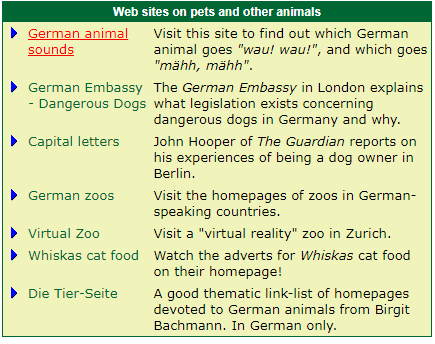Man(n)'s best friend?
The poster states proudly: "Wir gehören zusammen!" - "We belong together". And it is immediately apparent to the outsider that Germans adore their dogs. Cats are much less visible in German cities - there is a law which says they have to be kept in, and this is respected in Germany. Dogs, on the other hand, are taken everywher. It's not unusual to see them in restaurants with their own water bowls supplied by the proprietor. This is in part because German dogs have traditionally been well-behaved - they all have to be registered and vaccinated against rabies (die Tollwut), as this is prevalent in many areas among wildlife. You will also see signs in every park pointing out the strict "pooper-scooper" laws and designating special areas for dogs to swim in so that the rest is more pleasant for human bathers.
There are however several initiatives to help owners. Some parks or streets have a special area designated as a "Hundeklo" (= "doggy loo"). In popular dog-walking areas you will see vending machines (der Automat) for bags and scoops to get rid of mess, and bins are also provided. In Vienna, for example, certain areas are clearly designated as either "dog-free" (das Hundeverbot), "dog zones" (die Hundezone) or "a suitable place to walk your dogs" (der Hundeauslaufplatz).
Dog ownership however is one area in which the Germans are inclined to turn a blind eye to the regulations. John Hooper, Berlin correspondent for The Guardian wrote: "There are more dogs in Berlin than in most of Germany's other big cities put together. And an astonishing number can be found off their leads, not just rambling in the parks, but ambling along pavements, lounging in cafes and bars, and even in restaurants and clubs. Even members of the most popular breed, the pit bull terrier, roam about unhindered, along with rottweilers, dobermans and other dogs that look as if they eat a poodle or two for breakfast."

 英语
英语 日语
日语 韩语
韩语 法语
法语 西班牙语
西班牙语 意大利语
意大利语 阿拉伯语
阿拉伯语 葡萄牙语
葡萄牙语 越南语
越南语 俄语
俄语 芬兰语
芬兰语 泰语
泰语 丹麦语
丹麦语 对外汉语
对外汉语

